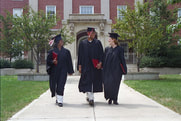
Undergraduate students applying for the H-1B applications have a few options. The F-1 student visa allows students to work up to 12 months in a field related to their major area of study. This is called Optional Practical Training (OPT). Students are allowed to apply for pre-completion OPT after they have been enrolled as a full time student for one academic year, and work 20 hours or less during regular academic semesters or terms and full time during academic breaks. Post-completion OPT allows students to work after they have completed their degree, and work either part time or full time. Students are only allowed to work a combination of 12 months, for example if a student worked 5 months before completing their degree under OPT, they will only be able to work 7 months under OPT after the completion of their degree.
If a foreign student is planning on working in the US after graduation and is aware that they will not be able to complete their degree requirements until after the H-1B deadline, they should consider using all or most of their OPT after they have completed their degree.This will allow them to remain and work in the United States before and after their diploma is ready and to apply for the H-1B the following April for the next fiscal year. Students that are earning or have earned a degree in either science, technology, engineering, or math should keep in mind that they are now able to apply for a 24-month extension to their post-completion OPT.
Applicants that have completed all their degree requirements, but will not graduated or received their diploma before the H-1B April filing date may be able to receive a H-1B degree certification letter from the university. The letter would be provided by the university’s registrar office. The letter would confirm that the applicant has completed all their degree requirements for graduation and the degree the applicant will be receiving. However, if a student is currently enrolled in a requirement needed for their degree, their university will not be able to issue a degree certification letter for them. This may be an option for many winter graduates, who have completed their degree but their diploma is not ready before the H-1B application deadline.
Applicants considering graduate school should be aware that USCIS exempts a certain number of applicants with a US master’s degree from the H-1B visa cap. Foreign students considering graduate school should evaluate their options and decided whether applying for the H-1B after completing graduate school may be a better option for them. Applicants should also look at their individual criminstances and speak to a lawyer to evaluate if are any other avenues for them to receive a visa and work authorization in the United States after graduation.
Sydney Wilson
HMA Legal Intern, Spring 2018



 RSS Feed
RSS Feed
